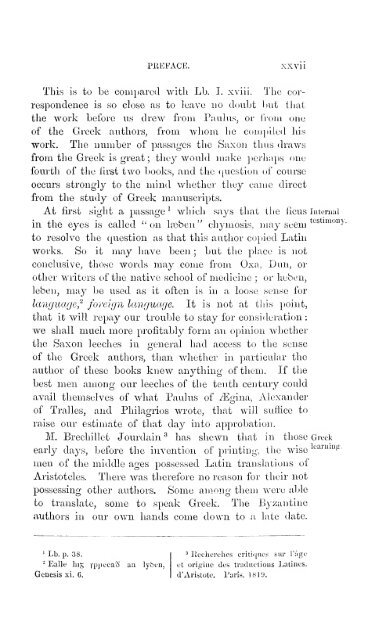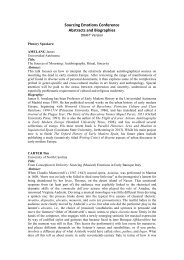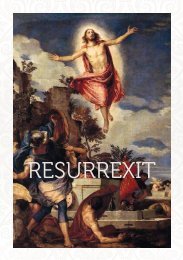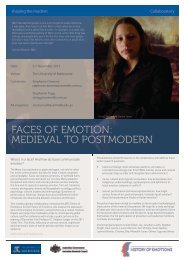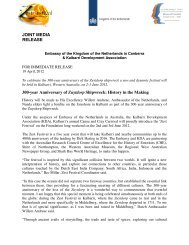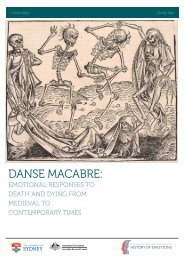- Page 7: RERUM BRITANNICARUM MEDII M\l SCRIP
- Page 10: 4 The works to be published in octa
- Page 13 and 14: LEECHDOMS, WORTCUNNING, STARCRAFT E
- Page 15: CONTENTS. Page Preface - - - - - -
- Page 19 and 20: PREFACE. No historical records are
- Page 21 and 22: ; PTIEFACE. IX food, chickens,' gib
- Page 23 and 24: PREFACE. XI brine.^ Salt fm* salted
- Page 25 and 26: PREFACE. xm tries, Roman. Among the
- Page 27 and 28: PREFACE. XV sliow that lie gave hon
- Page 29 and 30: PREFACE. XVli quicldy, splitting th
- Page 31 and 32: PREFACE. ' xis Malum Persicum, was
- Page 33 and 34: PREFACE. XXI In this doggrel, Bald
- Page 35 and 36: PREFACE. xxiii could such a book as
- Page 37: ; PREFACE. XXV drew his information
- Page 41 and 42: PREFACE. Xxix a fair practical sens
- Page 43 and 44: — — PREFACE. XXXI mented cross
- Page 45 and 46: PREFACE. xxxiii herb .Foniots palui
- Page 47 and 48: PREFACE. XXXV iElfric and Alfred is
- Page 49 and 50: PREFACE. XXXvii appears as neuter ;
- Page 51: ADDITIONS AND CORRECTIONS. *' Page
- Page 54 and 55: text ' ' Wanley [L^CE BOC.]^ fol. 1
- Page 56 and 57: 4 LiECE BOC. .V. Lsecebomaj" 5 if m
- Page 58 and 59: L^CE BOC. [xix.] .XVII. Lfeceboma)-
- Page 60 and 61: 8 L^CE BOC. .XXXII. Lsecebomaf picS
- Page 62 and 63: 10 L^CE BOC. men ym lim oj: lime op
- Page 64 and 65: 12 l.MCE EOC. .XLVII. Lascebomaf *j
- Page 66 and 67: 14 LiECE BOC. "j ]7one iniclan jobe
- Page 68 and 69: 16 L/ECE BOC. Romane -j eall luS yo
- Page 70 and 71: " 18 LiECE BOC. Alex. Trail. On ]n]
- Page 72 and 73: 20 L^CE BOO. be];e mib, pij heajrob
- Page 74 and 75: 22 L^CE BOC. on "Sa able pojiepeapb
- Page 76 and 77: 24i L^CE BOC. j-eoh ]7Ujih ha3penne
- Page 78 and 79: 26 LMCE BOC. jetjiijzelabu miS peal
- Page 80 and 81: 21 vivas. ^ 28 L^CE BOC. eajna imlr
- Page 82 and 83: ' 30 L^CE BOC. " Plinius, xxxii. 24
- Page 84 and 85: 32 L^CE BOC. fol. 12 a. liie mete J
- Page 86 and 87: 34 LiECE BOC. bopan humj ealjia em
- Page 88 and 89:
36 L^CE BOO. ptn bo on cypepen fset
- Page 90 and 91:
38 LJSCE BOC, ]ij> pypmum on eajum
- Page 92 and 93:
40 LiECE BOC. eajipicja • cji8ej:
- Page 94 and 95:
42 LiECE BOC. inej' jeallan mib hij
- Page 96 and 97:
44 LJ5CE BOC. 6pr pi] jon ilcan pep
- Page 98 and 99:
46 L^CE BOO. eyt Jjfejie jieaban ne
- Page 100 and 101:
48 LiECE P.OO. ])U oftoji ebnipafc
- Page 102 and 103:
50 L^CE BOC. jeblejenabjie 'cim;5an
- Page 104 and 105:
52 L^CE BOC. linutbeamej" jimbe -j
- Page 106 and 107:
54 L/ECE BOC. Jjopnep blolrman -j ]
- Page 108 and 109:
56 L^CE BOC. Ipile pi] ]on pceal eo
- Page 110 and 111:
58 L^CE BOC. ejzt; . jemm Imnan feo
- Page 112 and 113:
60 LMCE BOC. appotanan jejnib toSom
- Page 114 and 115:
G2 LyECE EOC fol. 23 a. jelasjian n
- Page 116 and 117:
04 L^CE T,OC. leje on 'j bjiinc' be
- Page 118 and 119:
^6 LJECE BOC. apulbop • popn •
- Page 120 and 121:
68. L^CE BOO. .XXVI. AyKiiKuffis. M
- Page 122 and 123:
7(^ LMCE BOC. meuj tofomne leje j^o
- Page 124 and 125:
72 ].iECE BOC. 6ft; pi]7 ]on belena
- Page 126 and 127:
74 L^CE EOC. to fpa fpa j^yn tpa pu
- Page 128 and 129:
76 lyece eoc. .XXXII. 'AA^ds. AiVKT
- Page 130 and 131:
78 LJECE BOC. Lsecebom pi] lijieofu
- Page 132 and 133:
80 LyECK ROC. fie fpinef pyyele o"5
- Page 134 and 135:
82 L^CE BOC. .XXXV. Me\avia. Be afp
- Page 136 and 137:
84 L^CE BOC. jejrelnej^j-e lisebbe
- Page 138 and 139:
86 L^CE BOC, fol. 32 b. Ibope }>onn
- Page 140 and 141:
88 L^CE BOC. ])Sd]\e butepan -j hji
- Page 142 and 143:
90 LMCE BOC. up aliebban mneje jetj
- Page 144 and 145:
92 LJiCE BOC. Pi] ealbpe piuibe tob
- Page 146 and 147:
94 LiECE BOC. mefean pmbe -j fpiSe
- Page 148 and 149:
96 L.ECE EOC. j'oben leje on f o]>e
- Page 150 and 151:
98 LiECE BOC. bjimcan fcenc fulne n
- Page 152 and 153:
100 L^CE BOO. fapan "j sejef f hpit
- Page 154 and 155:
102 LiECE BOC. Imnan "j epelafran -
- Page 156 and 157:
104 L^CE BOC. fol. 39 b. j-'inujlan
- Page 158 and 159:
106 LMCE EOC. bifceop pyjit • acc
- Page 160 and 161:
j MS. 108 L.ECE BOC. fcilne bpenc o
- Page 162 and 163:
110 LiECE BOC. pypt nioJ>epeapb •
- Page 164 and 165:
an ' 112 L^CE ROC. jepyjic anne hpm
- Page 166 and 167:
114 LMCE BOa [Blciim -j liujiu CO b
- Page 168 and 169:
{ ' Some U6 L^.CE P.OC. .XLVII. Lge
- Page 170 and 171:
' I haps | ,^ The only antecedent a
- Page 172 and 173:
120 L/ECE BOC. Oxa liejibe |nj-ne l
- Page 174 and 175:
122 L^CE BOC. jemenj pi6 himij jefm
- Page 176 and 177:
124 L^CE BOC. tT): pypm hanb ete
- Page 178 and 179:
12G LiECE BOO. .LTIT. ViS fmejca j'
- Page 180 and 181:
128 LtECE boc. fol. 48 b. fmijie mi
- Page 182 and 183:
| 130 L^CE BOC. LVIIII. ^ PiJ> Ifft
- Page 184 and 185:
" Dooms, 132 L^OE BOC. P'P l>]iyn b
- Page 186 and 187:
•' ' 134 " L^ECE BOG. ]>A }ujili
- Page 188 and 189:
'" 13G LiEOE BOO. bjience on pelfcu
- Page 190 and 191:
138 LMCE BOC. cipicjiaju • cjiifc
- Page 192 and 193:
{xjMRMl' stand Ni 140 L^CE BOC. bni
- Page 194 and 195:
142 L^CE EOC. .LXVI. fol 53 h. yi])
- Page 196 and 197:
' ' 144 L^CE P.OC. pefijibe "j ]'la
- Page 198 and 199:
' 144 L^CK EOC. peajihe ^ ylali]:'0
- Page 200 and 201:
146 LiECE BOC. .LXXI. Vi] pseje peo
- Page 202 and 203:
14S L^CE EOC. Jjpitnjef nilira ealb
- Page 204 and 205:
150 LMCE BOC. peajijiaf. 6j:t cealj
- Page 206 and 207:
152 L^CE BOC. tonican on }''am liiS
- Page 208 and 209:
154 L^CE BOC. . LXXXIIII. Zip mon \
- Page 210 and 211:
i5G L.ECE BOC. JOeayob 1)03] pits ]
- Page 212 and 213:
; 158 LMCE EOC. Book 11. .1. J9as l
- Page 214 and 215:
IGO LMCE BOC. majan ye mete abit-e]
- Page 216 and 217:
102 L^CE BOC. .XXIII. Lsecebomaf hy
- Page 218 and 219:
j 16-i L^.CE BOC. .XXX. Lfecebomaf
- Page 220 and 221:
' 166 L^CE BOC. .XXXIIII. Lseceboma
- Page 222 and 223:
]68 L^CE EOC. ma^^uu ]ja ^(ionb bla
- Page 224 and 225:
170 L^CE BOG. .L. Lsecebomaf ejrt ]
- Page 226 and 227:
-' 174 L^CE EOC. lol. 64 b. iirpsej
- Page 228 and 229:
. ''" ; 17G L.ECE EOC. jecynbon "j
- Page 230 and 231:
-' 178 L^OE TiOO. fpa j^eali ne lyn
- Page 232 and 233:
1 so {..Y.OK V.CiC. \iv.~ I'raubaii
- Page 234 and 235:
182 ].MCE BOC. ];a pyyi'ca lyn on j
- Page 236 and 237:
184 LMCE BOC. I'lnjau -J liuie mou
- Page 238 and 239:
186 LyECE BOO. unlufre ej-'t mtntan
- Page 240 and 241:
' The 1.88 L^CE BOL'. •;] jebo j'
- Page 242 and 243:
100 LyECE VA)(:. .XII. * n/jos t/uE
- Page 244 and 245:
' '' Read 1 fi2 L.^DOE p.or. l'.)ni
- Page 246 and 247:
cap. 1556, '' . 194 LMCE BOC. jemet
- Page 248 and 249:
19() I.^ECE BOC. Alexander \)e ]>i&
- Page 250 and 251:
108 L^CE BOC. V nepefeo)an fio htCf
- Page 252 and 253:
-' 200 L^CE BOC. . XVIII. \ip ]>8d]
- Page 254 and 255:
202 LMCE hoc. jebopfren bij ponne f
- Page 256 and 257:
' MS. This passage may he from Plii
- Page 258 and 259:
•20G LMCE BOG. {onnp fio ablapunj
- Page 260 and 261:
'20H L.-ECE ROC. hile . "j niejicej
- Page 262 and 263:
'-' i •' 210 J.MCE BOC. 5um ]i];]
- Page 264 and 265:
' ' For line 212 LMCE BOC. ]a finic
- Page 266 and 267:
•^ Koad 214 L^CE EOC. ]>a ipibpan
- Page 268 and 269:
21G LMCE BOC. jlopenbe ij-ene yele
- Page 270 and 271:
- cl8e|-nun5a, MS. | 218 LMCE BOC.
- Page 272 and 273:
220 L^CE BOC. .XXVI. Be pauilje col
- Page 274 and 275:
-' ; 900 LMCE P.or U. 83 n. meccum.
- Page 276 and 277:
erg. p. ' 224 L^CE BOC. bjiencen' I
- Page 278 and 279:
226 L.ECE BOC, Isecaj' cunnan J;onn
- Page 280 and 281:
I •'• •"' 22S L/ECE BOC. niea
- Page 282 and 283:
230 LMCE BOC. Pij pambe coj'e leo^
- Page 284 and 285:
232 LyECE BOC. jieofan • "j bagcj
- Page 286 and 287:
284 LJfiCE BOC. peonb. Pypc liim j'
- Page 288 and 289:
23G L.'ECE BOC. niajan ablura "j cl
- Page 290 and 291:
238 L^CE EOC. liopn jebsejineb to a
- Page 292 and 293:
240 L/ECE EOC. on ealaS ]'ele bjini
- Page 294 and 295:
242 L^CE BOC. .XXXVI. Be milce psej
- Page 296 and 297:
' 244 LiECE EOC. Of mettum -j oy. c
- Page 298 and 299:
'^ An 246 LiECE BOC. bunum libbaS p
- Page 300 and 301:
' I'rom | \ 248 L^CE BOC. Pi]7 fo^o
- Page 302 and 303:
250 L^CE BOC. pypc op humje "j of e
- Page 304 and 305:
252 L^CE BOC. "^ ^ y "J peallenbej'
- Page 306 and 307:
254 L.ECE BOC. unmihce ^sey mannej'
- Page 308 and 309:
2oG L^CE EOC. blob biS 50b to laBCa
- Page 310 and 311:
in nearly the same words by Aretseo
- Page 312 and 313:
260 LMCE BOC. •j l^anan cyraeS fi
- Page 314 and 315:
262 L^CE BOC. laupe]^ cpoppan jebea
- Page 316 and 317:
264 L^CE BOC. V . 'j 3m;ib .111. ii
- Page 318 and 319:
266 LiECE BOC. jefcanban bo oy jm j
- Page 320 and 321:
268 LMCE BOC. V cailic jrulne to bp
- Page 322 and 323:
270 LiECE BOC. Tan bsel j^unjei'
- Page 324 and 325:
ma 272 LMCE 1500. meoluc jij: ]>n ]
- Page 326 and 327:
274 LMCF. BOC. .LTTL To leohcum bji
- Page 328 and 329:
. 276 L^CE BOC. butan iiinO(Se fie
- Page 330 and 331:
j ,'chpikim ; 278 LiECE BOC. pum I'
- Page 332 and 333:
' 280 L.ECE i;oc. ^: W- -if- S' * ^
- Page 334 and 335:
I 282 LiECE BOC. in bej^mcen. Pypc
- Page 336 and 337:
284 L^CE EOC. jwiiiie gob yoy to
- Page 338 and 339:
286 l;ece boo. fol. 3 a. oil f Him
- Page 340 and 341:
288 JuMCR T,OC. ' pnlliiii leaj: on
- Page 342 and 343:
1 -' 290 L^CE BOC. 1 1 ftan hve] yi
- Page 344 and 345:
292 L^CE BOC. on eo]i)an • jenim
- Page 346 and 347:
294 L2ECE BOC mojijnaj" . III. yopa
- Page 348 and 349:
•' The 296 LiECE BOO. mtej ]n]} e
- Page 350 and 351:
'-^ ' Read 298 LiECE BOC. }am men ]
- Page 352 and 353:
300 LMCE BOC. [Book III.] y\]> heaj
- Page 354 and 355:
302 L^CE BOC. pj: man fie uj:an on
- Page 356 and 357:
304 L^CE BOC. ]am raonnum j^e beojr
- Page 358 and 359:
30G L^CE BOC. bpofclan pyl on ele 0
- Page 360 and 361:
; ; 308 LiECE BOO. ye him jebe] ymb
- Page 362 and 363:
olO LJiCE BOC. •j bilceop pyjit;
- Page 364 and 365:
' j-cenc 312 L.ECE BOC. I'pile inna
- Page 366 and 367:
. 314 LzECE BOC. V]]> ]on ]7e mon b
- Page 368 and 369:
316 LiECE BOC. jeiiiynhc --j ]'ij>
- Page 370 and 371:
318 LMCE BOC. bpenc obSe bpip j^ele
- Page 372 and 373:
o20 L/ECE BOO, j'ona j-el • xii.
- Page 374 and 375:
; 322 L^CE BOC. jepitaS ealle ape;^
- Page 376 and 377:
I 324 L^CE BOC. •j3 hit col fie j
- Page 378 and 379:
- 326 L^CE BOC. "j hjiepnejf pot bo
- Page 380 and 381:
328 LMGE BOCf. bjiocen ban fie on h
- Page 382 and 383:
330 L^CE BOC. Ttp 6]: pipe nelle ja
- Page 384 and 385:
832 L^CE BOC. becpeoli ]n\ |eoli ti
- Page 386 and 387:
334 L.ECE BOO. .XL. yiy Jpon ];e mo
- Page 388 and 389:
; 336 LJECF, BOC, j-ealc yele bjunc
- Page 390 and 391:
338 LMCE EOC. .XLVI. J)\\> {Bj-msel
- Page 392 and 393:
.340 L^CE EOC, fol. 122 a. .XLVIII.
- Page 394 and 395:
842 LiECE EOC. .LIIII. Pypc j'ealpe
- Page 396 and 397:
' 344 LJECE BOC. .LX. A^ypc johe ea
- Page 398 and 399:
346 L/KCE BOO. jjpijpii • liGt I'
- Page 400 and 401:
' mmcn. ;)48 L/ECE BOC. peajibe •
- Page 402 and 403:
I -550 L^CE Eor. cepebjio • be j:
- Page 404 and 405:
.352 LMCE Bor. bujifcon ne }:iinhia
- Page 406 and 407:
354 L^CE BOC. jyjjpipan • ^eajipa
- Page 408 and 409:
G 35 LMCE BOC. pulle fecje]' • -j
- Page 410 and 411:
358 L/ECE BOC. Pi]7 majaii psepce p
- Page 412 and 413:
360 LEECH BOOK. Ill, Perhaps one fo
- Page 415 and 416:
; GLOSSAEY. The following glossary
- Page 417 and 418:
AC- TABLE OF CONTRACTIONS. PRINTED
- Page 419 and 420:
. lican GLOSSAHY. A. A, as prefix,
- Page 421 and 422:
— — GLOSSARY. 3G9 JEscl'iiorii
- Page 423 and 424:
' perhaps — — GLOSSARY. 371 Aur
- Page 425 and 426:
— GLOSSARY. Bjiecan Blopan, prset
- Page 427 and 428:
— GLOSSARY. bjo Cayyac, gen. in -
- Page 429 and 430:
. The . neous GLOSSARY. 377 Clujre
- Page 431 and 432:
\ " — ; — GLOSSARY. Dile cont.
- Page 433 and 434:
— GLOSSARY. 381 Gyelaf-e ccwt. cu
- Page 435 and 436:
— GLOSSARY. ;83 Cop's yps cont. h
- Page 437 and 438:
— GLOSSARY. .385 Fleosan,j^ow, no
- Page 439 and 440:
— — GLOSSARY. :iS7 Gej;yman cui
- Page 441 and 442:
; GLOSSARY. 389 Glojpypr, fern., ge
- Page 443 and 444:
— ; GLOSSARY. 391 Hares lettuce c
- Page 445 and 446:
— — GLOSSARY. 393 ]>ymele cont.
- Page 447 and 448:
— ; GLOSSARY. 395 J^jieejnej- }0C
- Page 449 and 450:
— — GLOSSARY. fl% Lcac cont. Cj
- Page 451 and 452:
; GLOSSARY. 399 CDape, Lb. I. xxxi.
- Page 453 and 454:
— GLOSSARY. 401 Napa, 7iever, Lb.
- Page 455 and 456:
— ; GLOSSARY. 403 Renhpian— co
- Page 457 and 458:
— GLOSSARY. 405 Sisj-once, a wort
- Page 459 and 460:
— GLOSSARY. 407 SuKau, to moisten
- Page 461 and 462:
; — GLOSSARY. 409 Tojib, a piece
- Page 463 and 464:
— ; GLOSSAKY. 411 J7y]im cont. In
- Page 465 and 466:
; — GLOSSARY, 41S peapm, gut, pi.
- Page 467 and 468:
INDEX OE PROPER NAMES. Achilles, Hb
- Page 469 and 470:
LIST OF WORKS PUBLISHED By the late
- Page 471 and 472:
Proceedings and Ordinances of the P
- Page 473 and 474:
— MoN OMENTA HiSTORiCA Britannica
- Page 475 and 476:
CALENDAliS 01^ STATE PAPEllS. [Impe
- Page 477 and 478:
Calendar of State Papers, Domestic
- Page 479 and 480:
11 9. EuL0GiD3i (HisTORiARUM siVE T
- Page 481 and 482:
13 31. Year Books op tue Reign op E
- Page 483:
15 HisTORTA MiNOK Matth^i PAras. Ed
- Page 489 and 490:
UC SOUTHERN REGIONAL LIBRARY FACILI


